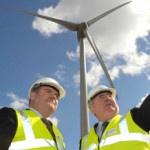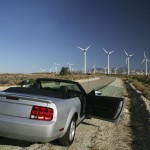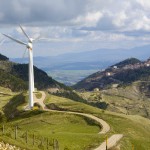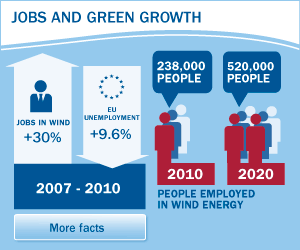 The European Commission needs to provide data to compare subsidies for renewables with the “far less transparent” subsidies for coal, oil, gas and nuclear, Irish Energy Minister and current EU President Pat Rabbitte says in the latest Wind Directions magazine.
The European Commission needs to provide data to compare subsidies for renewables with the “far less transparent” subsidies for coal, oil, gas and nuclear, Irish Energy Minister and current EU President Pat Rabbitte says in the latest Wind Directions magazine.
Minister Rabbitte, who is one of the keynote speakers at the opening session of EWEA 2013 this morning, also warns that moving to a 2030 low carbon target would be damaging to the 2020 renewable energy target.
The minister also discusses energy security, highlighting the role of renewables in reducing future “volatility”.
Read the full interview and more in the latest Wind Directions
 Ontario, Canada’s most populous province with a population equivalent to Ireland, Northern Ireland, Scotland and Wales combined, has decided to abandon coal-fired electricity a year ahead of schedule.
Ontario, Canada’s most populous province with a population equivalent to Ireland, Northern Ireland, Scotland and Wales combined, has decided to abandon coal-fired electricity a year ahead of schedule.
“The early closure is a result of Ontario’s strong conservation efforts, a smarter electricity grid and a diverse supply of cleaner energy,” Dalton McGuinty, Ontario’s Premier said. “Shutting down the last coal plants in Southern Ontario will significantly reduce greenhouse gas emissions and save the province $ CAN95 million (€72.4 million).”
In a press release, the Canadian Wind Energy Association (CanWEA) said Ontario has reduced use of coal by 90% since 2003 while at the same time bringing online 2,000 MW of clean, emissions-free wind energy, up from 400 MW in 2006.
 Beyond an anaemic international agreement to extend the Kyoto Protocol to 2020, it is hard to see what positive momentum was achieved at the end of the two-week UN conference on climate change which ended on Saturday in Doha.
Beyond an anaemic international agreement to extend the Kyoto Protocol to 2020, it is hard to see what positive momentum was achieved at the end of the two-week UN conference on climate change which ended on Saturday in Doha.
While almost 195 nations did endorse the proposal to extend Kyoto past 2012, no new targets for reducing toxic global greenhouse gas emissions from burning fossil fuels and no binding plan to keep global temperature rise to no more than 2 degrees Celsius were announced.
Even the Executive Secretary of the UN Framework Convention on Climate Change (UNFCCC), Christiana Figueres, gave a luke warm response to the meeting.
 Electrical power generation from wind energy last year prevented as much global warming pollution as taking 13 million cars off the road, says a new widely-quoted report published in the US.
Electrical power generation from wind energy last year prevented as much global warming pollution as taking 13 million cars off the road, says a new widely-quoted report published in the US.
The report — Wind Power for a Cleaner America: Reducing Global Warming Pollution, Cutting Air Pollution and Saving Water — adds that wind power saved the equivalent amount of 26 billion gallons of water, more than enough to meet the annual domestic use needs of a city the size of Boston.
Released last week by Environment America Research & Policy Center, a federation of state-based, citizen-funded environmental advocacy organizations, the report also said wind energy helped reduce air pollution, including reductions of 137,000 pounds of nitrogen oxide emissions and 91,000 pounds of sulfur dioxide emissions.
 Wind and other renewable energies must be given immediate priority over fossil fuels and nuclear power if the EU is serious about its commitment to cut greenhouse gas emissions by 80-95% by 2050, says a new report by the World Wildlife Fund for Nature (WWF). Without such action the EU will only manage a 40% cut in emissions by 2050, warns the NGO.
Wind and other renewable energies must be given immediate priority over fossil fuels and nuclear power if the EU is serious about its commitment to cut greenhouse gas emissions by 80-95% by 2050, says a new report by the World Wildlife Fund for Nature (WWF). Without such action the EU will only manage a 40% cut in emissions by 2050, warns the NGO.
“The spiralling economic, social and environmental cost of our current energy system, and the looming threat of climate change disaster, flip the burden of proof: anything other than sustainable renewables used efficiently should now have to justify their existence, not the other way around as has historically been the case,” says Jason Anderson, head of climate and energy at WWF’s European Policy Office.
 The European Commission needs to provide data to compare subsidies for renewables with the “far less transparent” subsidies for coal, oil, gas and nuclear, Irish Energy Minister and current EU President Pat Rabbitte says in the latest Wind Directions magazine.
The European Commission needs to provide data to compare subsidies for renewables with the “far less transparent” subsidies for coal, oil, gas and nuclear, Irish Energy Minister and current EU President Pat Rabbitte says in the latest Wind Directions magazine.






 Comments
Comments



